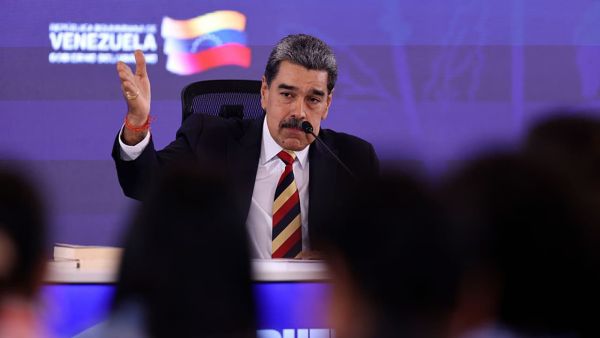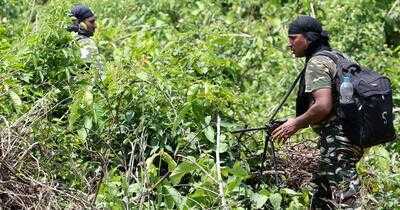
Tensions between the US and Venezuela are escalating as the United States deploys warships, F-35 fighter jets, and thousands of troops to the Caribbean to target drug cartels. Venezuela has accused Washington of provocation and fears invasion.
US-Venezuela Conflict: In the turquoise waters of the Southern Caribbean, warships now dot the horizon. The US Navy has sent a fleet of seven vessels and a nuclear-powered submarine closer to Venezuela than at any time in recent years. On board are more than 4,500 American troops, including thousands of Marines, part of what Washington calls its biggest operation against Latin American drug cartels in decades. This show of force is now being mirrored in the skies. On Saturday, five F-35 fighter jets touched down at the former Roosevelt Roads base in Ceiba, Puerto Rico. Helicopters, Ospreys, and fresh personnel followed, a buildup that has already triggered protests from Puerto Ricans wary of the island’s creeping militarisation. The arrival of the F-35s, paired with the naval firepower offshore, underscores how rapidly the confrontation is escalating.

The Trump administration says the mission is simple: to stop the flow of cocaine. For months, US officials have accused Venezuela’s president, Nicolas Maduro, of running a vast narcotics network called the Cartel de los Soles. They claim that gangs linked to his government pose an immediate threat to the United States, and they have even offered $50 million for Maduro’s capture.
But in Caracas, the story sounds very different. To Maduro and his allies, the warships are not just about drugs—they are a warning sign of something bigger. Venezuela has responded by sending its own vessels to patrol the coast, mobilizing 15,000 troops to its Colombian border, and calling on ordinary citizens to join the militia. Busloads of volunteers have begun training with rifles and handguns, convinced that their homeland is being prepared for invasion. The fight is not only on the ground and sea. The issue has reached the halls of the United Nations. Venezuela’s ambassador has warned the world that the United States is running a “propaganda operation,” one designed to pave the way for military intervention. “They even sent a nuclear submarine,” he said. “Who fights drug traffickers with nuclear submarines?”
Military Escalation by US
In recent weeks, American forces sank a suspected drug boat, killing 11 people on board. Trump later defended the controversial boat strike, describing it as a military operation against “terrorists.” Writing on his social media platform Truth Social, he said, “The strike occurred while the terrorists were at sea in international waters transporting illegal narcotics, heading to the United States. The strike resulted in 11 terrorists killed in action. No US Forces were harmed in this strike … Please let this serve as notice to anybody even thinking about bringing drugs into the United States of America. BEWARE!”
Days later, a Venezuelan fishing vessel was seized and held for hours. To the United States, these were tactical strikes against narcotics networks. To Venezuela, they were acts of provocation, signs that Washington is laying the groundwork for something far more dangerous: an invasion. Foreign Minister Yvan Gil condemned the fishing boat seizure as a “direct provocation” and accused the US of abusing military power in what should be a law enforcement matter. President Maduro has rallied troops and militias at home, warning that the nation must be ready to defend its sovereignty.
In Washington, Donald Trump has been put in a spot of bother by lawmakers, both Democrats and Republicans, who have sought accountability. Senator Tim Kaine of Virginia, joined by two dozen Democratic colleagues, wrote to the White House questioning the legality of the strike. They argued that the administration had provided “no legitimate justification” for the killings. Senator Jack Reed of Rhode Island went further, telling the Senate floor that America’s armed forces “are not law enforcement agencies” and should not be used to “hunt down suspected criminals and kill them without trial.” Republican senator Rand Paul, who chairs the Senate committee on homeland security and government affairs, strongly criticised the administration for these actions.
The Trump administration, however, has stood its ground. Officials insist the actions were lawful and necessary. Secretary of State Marco Rubio described Venezuelan cartels as an “immediate danger” to American lives, while White House spokesperson Anna Kelly defended the President’s decision. Trump, she said, had acted “in accordance with the laws of armed conflict” to protect the nation from deadly narcotics—and was delivering on his promise to take the fight directly to the cartels.
Why Are There Fears Of an Invasion?
It remains to be seen how the situation will unfold. According to reports, the vessel struck by the U.S. military off Venezuela was already turning back toward shore when it was targeted, raising fresh questions about the legality and timing of the strike. A study by the Center for Economic and Policy Research found that US sanctions against Venezuela were linked to over 40,000 deaths in the first year (2017–2018). The authors argued that these sanctions violate international law, including the Geneva and Hague Conventions, which prohibit the collective punishment of civilian populations. The US had also delegitimized Nicholas Maduro, and lending supporting to opposition candidate Edmundo Gonzalez. According to the US, Venezuela’s National Electoral Council quickly declared Maduro as the winner without providing detailed vote counts.
Regional allies and political analysts have often observed that large-scale US military operations in the waters of another country can signal intentions beyond immediate tactical objectives. Historically, the presence of warships, submarines, fighter jets, and thousands of troops near a nation’s coastline has been interpreted as a show of force designed to pressure governments politically or to prepare for potential intervention. In the case of Venezuela, the deployment of U.S. naval assets and the buildup in the Caribbean are seen by some neighbors and international observers as more than just a crackdown on drug trafficking—they may serve as leverage in the ongoing political conflict with President Nicolás Maduro. The combination of strikes on suspected cartel vessels, seizures of local ships, and rhetoric from the U.S. administration contributes to concerns that these military maneuvers could precede diplomatic coercion or, in an extreme scenario, direct military action.
-
Shocking! IIM Graduate Sets Self Afire After Consuming Poison In Indore; Leaves Behind Suicide Note

-
Maoist leader Sujatha surrenders before Telangana Police

-
'Not Here To Taste Power': Nepal Interim PM Sushila Karki Seeks Public Support In First Address
-
Martin Lewis' wife Lara Lewington admits 'I'll never be able to' in rare marriage insight

-
Truffle Fries, Guacamole Tortilla Chips, Kunafa-Inspired Dessert; It's A Free-Wheeling Food Party At Mumbai's Cream Centre
